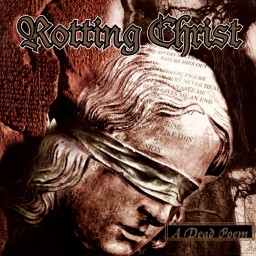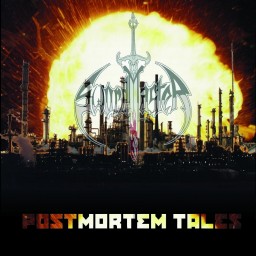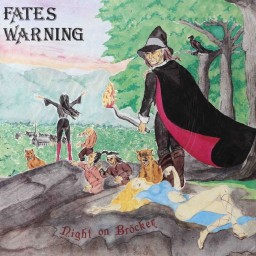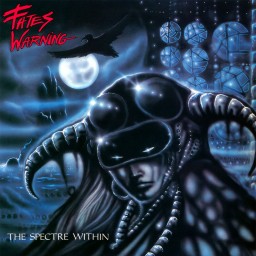Mike Morphett's Reviews
Coming on the heels of "Trirarchy Of The Lost Lovers", an accomplished, if under-produced, melodic black metal milestone, "A Dead Poem" was a curious leap for Rotting Christ. While I'm unsure of what pressures were put on the band by their label, the record was a radical departure for the band and came close to an outright aping of two of Century Media's most successful releases of the time: "Down" by Sentenced and "Irreligious" by Moonspell. If I were to take the short road, a halfway point between those records would not be an inaccurate review of this album. It features the same slightly dry Siggi Bem Woodhouse Studios sound, was produced by Xy (Samael's "Passage" also being a big success for Century Media at that time), and the most accessible track, "Among Two Storms", features a prominent guest vocal performance form Moonspell's Fernando Ribiero.
The opener "Sorrowfull Farewell" is a solid rocker, borrowing heavily from the Sentenced-perfected method of adding a Euro-gothic feel to what is musically a pretty traditional romp through some Y&T style 80s metal, topped with Sakis' black metal snarl. The commercial potential of the record really peaks with the second track, "Among Two Storms", which introduces some gothic pomp and melody to the vocals with Fernando's contribution to the chorus, but also makes it sound a little too close to something off a Moonspell record. The title track then slows things down and takes a darker, dissonant turn, more in the vein of early Novombre and Katatonia, but still sounding uniquely Greek. These three tracks really set the template for the remainder of the record, without too many further surprises. Other highlight's include "Full Colour Is The Night" and the ponderous "Semigod"
It would be hard to argue against the assertion that this album was a blatant dig in the same market furrow that Century Media had been so successfully ploughing for their other bands, were it not for the fact that Rotting Christ have, before and since, made unpredictable creative leaps between albums on a regular basis; sometimes successfully and sometimes less so, but only occasionally coinciding with trends. That being the case, I'm willing to judge this album on it's own merits: it's an enjoyable listen and a solid example of some of the more commercially viable post-black metal of the late 1990s.
Genres: Gothic Metal
Format: Album
Year: 1997
This record from the early days of the retro thrash trend came onto most people’s radar, if at all, due to the fact that the band was led by Emil Nödtveidt, little brother of Dissection mastermind Jon Nödtveidt. While both bands play Swedish blackened death metal, they couldn’t be further apart in attitude and execution. This album is an exercise in balls-to-the-wall retro thrash, and the band evidently have a fantastic time playing it. This would swiftly become an overcrowded and unoriginal little subgenre, but Swordmaster, along with bands like Witchery and The Crown, who were exploring a looser and more raucous re-styling, were early adopters.
There is nothing original here, this should be clear from the outset. However, it’s enjoyable to listen to as it rattles along like a runaway train, drums clattering like a dropped bag of spanners, guitars desperately racing to keep up (mostly succeeding). A mixed bag of Teutonic thrash influences pervade the album, most prominently early Kreator (“Postmortem Tales”) and Destruction (“Black Ace”), with a Schmier-like snarl to the otherwise black metal-styled vocals and a dry, thin-as-paper Harris Johns production that still manages to sound heavy. The paint-peeling guitar leads smack of Nasty Savage and Slayer.
Some Swedish melodic death sounds do worm their way into the songs at times, like the harmony guitar lines behind the chorus of “Crush To Dust”, and some songs do slow down to more of a Celtic Frost plod in places (“Claws Of Death”, “The Serpent Season”), but I think the record as a whole is best summed up by a hilarious tongue-in-cheek moment in “Past Redemption”: a full speed thrash attack that breaks into a little Malmsteen-meets-Helloween neo-classical interlude mid-way through... then returning to the rifferama with a phlegm-gargling one-liner: “back to business!”
Good friendly violent fun.
Genres: Thrash Metal
Format: Album
Year: 1997
Fates Warning’s debut album is charming and fun to listen to - it is the sound of a band wearing their influences on their sleeves, yet to find their own sound, but definitely headed in the right direction. The playing is solid, the songs reasonably constructed, and the production isn’t terrible, but it is far from original and is really only a hint at what they would achieve on their subsequent albums. Absent are the progressive guitar flourishes and time signatures, the more idiosyncratic vocal acrobatics from John Arch, and the more introspective lyrical themes and allusions.
That being said, there are some dusty metal gems to be dug up here. The opener “Buried Alive” sounds like it could have been an out-take from Judas Priest’s “Screaming For Vengeance” sessions - all racing British metal riffs and soaring vocals. The album continues with a barrage of influences that are unmistakable: their fellow Americans Queensryche (“The Calling”), whose debut EP had been released the previous year and whose sound was a new fusion of NWOBHM and American melodic metal; Judas Priest again (“Kiss Of Death”, “Misfit”); and of course Iron Maiden (“Night On Brocken”, “Soldier Boy”) aided by John Arch’s similar voice soaring ever higher than Bruce’s. “Damnation” is an engaging epic towards the end of the record, again showing where the band would head when they began to unfold their musical wings on their next record.
All in all, this is a fun record, but not an essential listen. It’s certainly not where I’d start listening to Fates, but it is an enjoyable listen for fans of early Queensryche, and of interest to fans as a snapshot of the band in their formative years, offloading their less original material and on the cusp of creating something more.
Genres: Heavy Metal
Format: Album
Year: 1984
The second album from Fates Warning was a big step forward, and began to establish their own sound. The production, while dated these days, is a big improvement on their debut, and there is a satisfying organic warmth to the rhythm guitars. Jim Matheos is clearly stretching his songwriting wings here, exploring trickier time signatures and arrangements; the roots of their progressive leanings are here, but this is still very much a traditional/power US metal record. In that milieu, the lead guitars are not quite at their peak yet, but this would be Victor Arduini’s last record with the band. John’s vocals are strong and impassioned, diving up and down his range, in a unique combination of Bruce Dickinson’s tone and Geoff Tate’s register. The songs are mostly strong, but there is still some weaker NWOBHM-inspired fare filling the gaps and stops the album being a killer from start to finish.
The more challenging arrangements kick off almost immediately with opener “Traveler In Time”, which chugs along at a metal mid-pace, with occasional Uriah Heep-like interludes, and has a soaring chorus melody. However, it suffers a common issue to some of the tracks on this album, which is that it spends much of it’s close to 8 minute duration being held in check in tempo - the songs feels like it wants to take off at a gallop at times, but when it fails to do so it feels a little anti-climactic. Things do pick up to a more frenetic pace in places (“Orphan Gypsy”, “Without A Trace”), but other tracks (“The Apparition”) feel like they’re being held back a little. The choruses are some true standout moments of the album, featuring strong yet unpredictable melodies and rich harmonies (“Without A Trace”, “The Apparition”), which make the songs on this album quite memorable, much more so than those on it’s predecessor, and hinting at what was to come on it’s successor.
The album closes strongly, “The Apparition” and “Kyrie Eleison” being two of the tracks that really stand out in the Fates catalogue, and encapsulate this stage in the band’s development from derivative youngsters to influential champions of a new genre. It is somewhat overshadowed by its successor, but has stood the test of time and is a pleasure return to for repeated listens, especially after a long absence when you realise how many of those choruses you remember.
Genres: Heavy Metal Progressive Metal
Format: Album
Year: 1985













